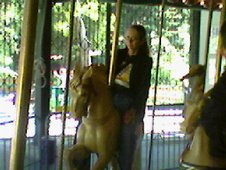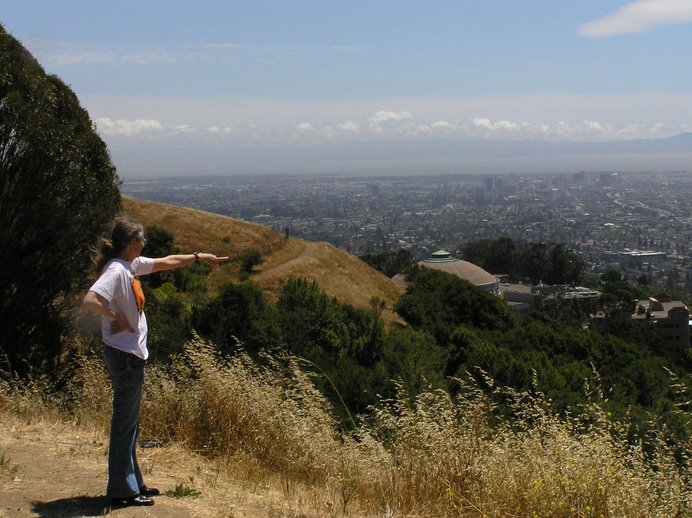“All record of what the Palestinians call the Nakba – the Catastrophe — are absent from Israeli school curricula, from most history and geography books and even from maps of Israel itself. The sites of the old Palestinian villages have even been erased and re-named on all of the maps. And even today there is no official Israeli recognition or commemoration — let alone apology — for the Nakba.”
We got out and walked around the land where the village used to be. There was nothing left of the village except a lot of scattered stones. Another bunch of cows appeared as we walked down a dirt road. Photo op! Except that these cows had horns. Big horns. Lots of horns.
“In the Zionist collective memory,” continued my Israeli friend, “the Palestine of 1948 was a ‘A land without people for a people without a land’. Yet the place where Israel was founded was never empty. This land was home to almost one million Palestinians living in over 700 villages and cities, most of which were depopulated and then re-named in the period during and immediately following 1948.” Now all there is here are cows. And cow poop. Oops.
It was a peaceful afternoon in the country. We walked up the path to the top of another hill. Terrific view — almost like the Sierra Nevada foothills near Auburn and the California gold rush country on the way to Lake Tahoe.
“Here is an old fortress that was bombed by the Israeli air force back in 1949. 99% of the houses were still standing in 1950 but the Israeli army returned and blew up everything that was left. You are now standing on the site of the elementary school and the high school. The village used to make its living by growing bees and harvesting honey.” Not any more. Nothing was left. It looked like even the bees had left town.
“And here is the Muslim cemetery and across the road is the Christian cemetery, dating back from the time of the Crusades.” Now a small stone building was all that was left. “This used to be the minister’s home. For hundreds of years, Muslims and Christians had lived — mostly — in peace in this village. And over there was the village pool and the village green.”
On that day in 1950 when the rest of the villagers had been driven away by the occupying Israeli army, one family had been down in the fields during the seizure and occupation of the village. “When they came back and one of their boys had a wound that he had gotten while farming, the Israeli soldiers said that it must have come from resisting the invasion so the soldiers tortured him and killed him. His parents were too scared to even come out of the trees in order to collect his body. The rest of the surviving villagers had run and hidden in their olive orchards but after a few days without food, two old men went back to the village to try to get supplies from their homes. They were shot.”
The Israeli army wanted to hide any evidence of destroying the village. “But they were stupid. They left all the stones.”
Then somehow we got into a discussion of eye-wear and I gave my famous “glasses as accessories” speech. “Nobody manufactures yellow glasses,” I lamented. “Do I have to do everything myself? Now I have to manufacture glasses too?”
Then we toddled off to what was left of the village church. I met an Arab-Israeli man there who was also touring the ruins and he told me his story. “My grandfather was a Palestinian and he had a very high regard for education. When I was a boy, he made each of his grandchildren learn a different language. Unfortunately I got stuck learning English,” he joked. “The others learned French, German, Spanish and Chinese.” Chinese? “Yes but unfortunately the only textbook he had was Chinese to English so he was forced to learn English too.”
Apparently when the Israeli soldiers stormed the village back in 1950, they confronted the headman, who was a Christian. “Why are you defending these Muslims,” the Israeli commander asked and the headman answered that, “in this one moment, we now are all belonging to the same religion -- and it is God, not us, who will sort out who is good and who is bad.”
The air today smelled of pine trees. There were stone blocks everywhere. Thousands of them. One of the villagers who had survived the massacre and who had come back for the day spoke to us. “Every year since the Nakba, those of us who are left feel so empty inside. The horrible violence seemed so senseless. It has split our bodies and minds. Our bodies stand here 57 years later but our souls are still back in our village, so long ago, in this beautiful place. And no matter what the Israeli history books say, this village did once exist.” That man survived. And he remembers.
“We thought at first that we might be allowed to come back to our village,” said the man. Who could blame him for wanting to come back. This place was -- and is -- beautiful. “Other villages took us in but then they too were destroyed. But we will never give up our dream of someday coming back here, back to our home.”
Apparently after 1950, this village was declared to be a “military area” and so the villagers were never allowed to return. And even today, even with all the trees and the cows, this village is still labeled a “military zone”.
Apparently there is another village that is suing to get their land back. “And we want our land back too. You can see how holy this place is. It’s not only what you see with your eyes now -- but beyond, to the future. We all must remember that we are standing in front of God. And every Palestinian must remember that somewhere he has a village.”
Strange that even now the original villagers aren’t allowed to come back.
The sun was beginning to set so we walked back to the bus and started the long drive back to Jerusalem –- not long in terms of driving from San Francisco to Los Angeles or nothing, but long in terms of driving through Israel. Now we can eat? I’m ready. This morning's chocolate bar is long gone.
Nope, no dinner for us. We stopped at a truck stop and bought junk food. “I’ve got bad news,” said our guide. “We were supposed to meet with Jeff Halper from ICAHD tonight but he is stuck in an airport in Canada.” Our guide was really upset. I was disappointed too. Halper is an Israeli who is very influential in the fight to stop Palestinian home demolitions in East Jerusalem, is an expert in this field and has written several excellent books on the subject. But just then our bus rounded a curve and we suddenly saw the Mediterranean Sea spread out before us –- with the sun glowing all red and glorious as it slipped down toward the watery horizon. Magnificent. I almost forgot about food!



%20-%20jpstillwater@yahoo.com%20-%20Yahoo%20Mail.png)

